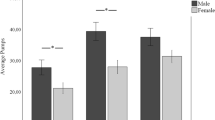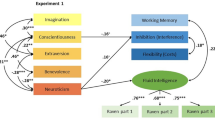Abstract
Literature on sex differences in impulsivity has tended to focus on differences between groups, while ignoring relationships beyond zero order correlations. The purpose of this study was to evaluate Maccoby's hypothesis (1966) of opposite-direction correlations where the relationship between a set of variables (e.g., impulsivity and intellectual ability) is curvilinear, with males and females being systematically distributed on opposite sides of the curve. The Primary Mental Abilities (PMA) and Matching Familiar Figures tests were administered to 44 males and 49 females. The relationship between all of the PMA subtests and impulsivity was curvilinear for males, but linear for females on all but one of the subtests. The importance and implications of examining distribution differences rather than group differences are discussed.
Similar content being viewed by others
References
Ault, R. L. Problem-solving strategies of reflective, impulsive, fast-accurate, and slow-inaccurate children. Child Developmment, 1973, 44, 259–266.
Block, J., Block, J. H., & Harrington, D. M. Some misgivings about the MFF test as a measure of reflection—impulsivity. Developmental Psychology, 1974, 10, 611–632.
Denney, D. R. Reflection and impulsivity as determinants of conceptual strategy. Child Development, 1973, 44, 614–623.
Harrison, A., & Nadelman, L. Conceptual tempo and the inhibition of movement in Black preschool children. Child Development, 1972, 43, 657–668.
Kagan, J., Rosman, B. L., Day, D., Albert, J., & Phillips, W. Information processing in the child: Significance of analytic and reflective attitudes. Psychological Monographs, 1964, 78(1, Whole No. 578).
Maccoby, E. E. Sex differences in intellectual functioning. In E. E. Maccoby (Ed.), The development of sex differences. Stanford: Stanford University Press, 1966.
Maccoby, E. E., & Jacklin, C. N. The psychology of sex differences. Stanford: Stanford University Press, 1974.
Salkind, N. Errors and latency on the MFF: A reassessment of classification strategies. Paper presented at the meeting of the Society for Research in Child Development, Denver, April 1975.
Salkind, N. J., & Wright, J. C. Impulsivity and efficiency: A revised model. Paper presented at the meeting of the Society for Research in Child Development, Nashville, April, 1976.
Thurstone, L. L., & Thurstone, T. G. Primary mental abilities. Chicago Science Research Associates, Inc., 1963.
Yando, R. M., & Kagan, J. The effects of task complexity on reflection—impulsivity. Cognitive Psychology, 1970, 1, 192–200.
Author information
Authors and Affiliations
Additional information
Support for this study has come from the Office of Research Administration, University of Kansas, Grant Number 3581-5038. This paper was presented in part at the meeting of the American Psychological Association, Chicago, August 1975, Division 7.
Rights and permissions
About this article
Cite this article
Salkind, N.J., Poggio, J.P. Sex differences in impulsivity and intellectual ability. Sex Roles 4, 91–96 (1978). https://doi.org/10.1007/BF00288379
Issue Date:
DOI: https://doi.org/10.1007/BF00288379




